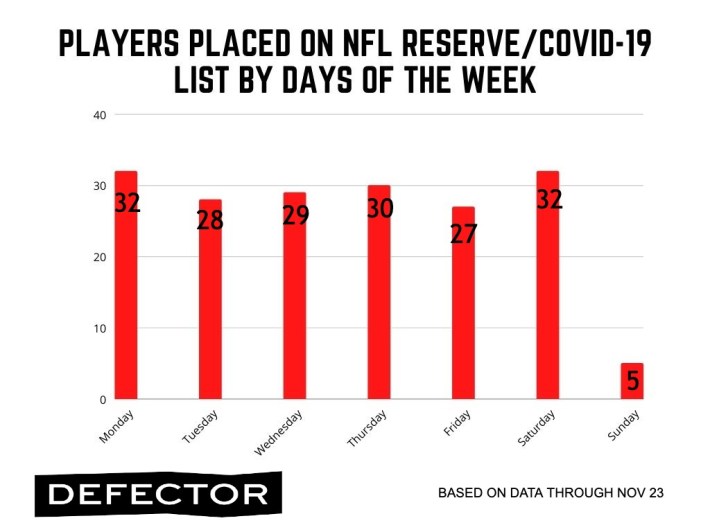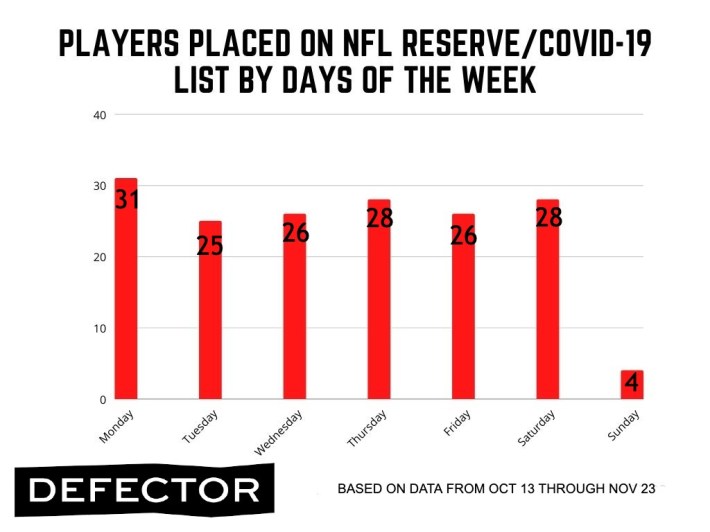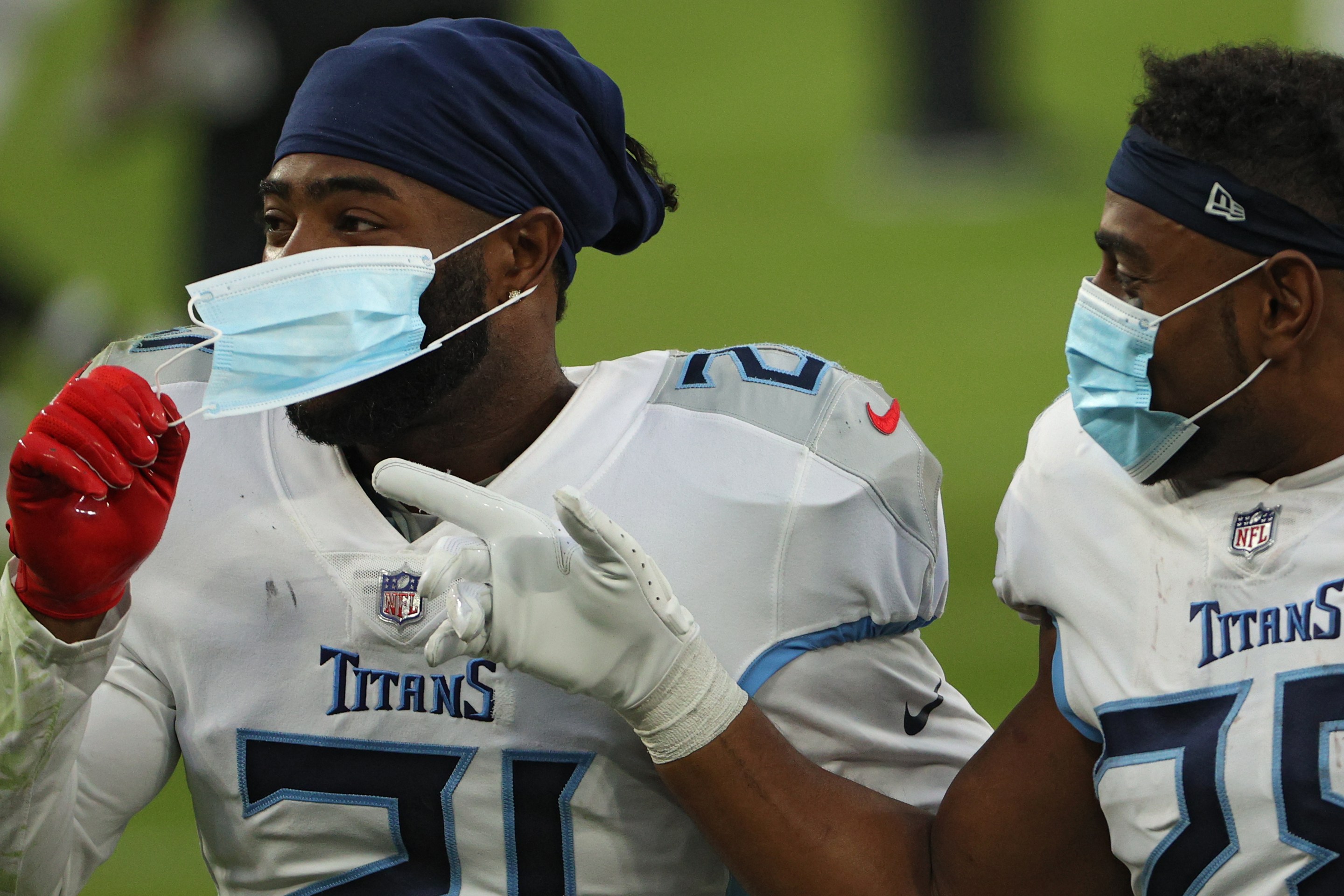A whole bunch of NFL players were placed on the reserve/COVID-19 list this week. Vikings wide receiver Adam Thielen (who had 127 receiving yards just the day before) was placed on the list on Monday. Three members of the Ravens (RBs Mark Ingram and J.K. Dobbins and NT Brandon Williams) were all placed on the list Monday, too, and today brought news that another group of Ravens had tested positive as well:
Isn’t that strange? You might think to yourself. All of these guys were on the field for Sunday's games, and yet their illness somehow evaded the league's allegedly stringent testing program. If you've been paying close attention to these things, you may have felt like something of a pattern is developing. A wave of positive COVID-19 tests are reported early in the week, players are isolated and team facilities are shut down, and by Sunday everything has worked itself out in time for a full slate of games to be played.
Using numbers released from teams and NFL reporters, I pulled together a dataset of players being placed on and coming off the reserve/COVID-19 list this season. The list isn’t perfect; it relies on whatever information the NFL has felt like sharing, and the league told me they do not have a central list of players who have been put on the reserve/COVID-19 list. So, it's all we have.
Here’s what I found:

Sunday is by far the least likely day for a player to be placed on the reserve list. There is at least one partial explanation for this. The NFL began the season saying it would test every day except game day. But in mid-October the league changed its mind, augmenting the protocol to begin testing on game day. No official reason was given for this, and an NFL spokesperson declined to clarify the rationale behind the change in policy. But it’s pretty reasonable to assume that this Oct. 12 change was related to the outbreak on the Tennessee Titans that caused scheduling issues earlier in the season.
So I went back and adjusted the data to only include dates after Oct. 12. Here’s what that looks like:

Two of the four players placed on the list on a Sunday were not playing that day. Dru Samia (OL) was placed on the list on Sunday, Nov. 15. The Vikings that week played on Monday. Baker Mayfield (QB) was placed on the list on Sunday, Nov. 8. The Browns were on a bye week.
When I looked more closely, I only found two players in my research across all game days (Monday, Tuesday, Thursday and Sunday) who were been placed on the reserve/COVID-19 list on a day his own team played. Lachavious Simmons (OL) of the Bears, who was placed on the list on Sunday, Nov. 8. The second was Lamarcus Joyner (CB) of the Raiders, who was placed back on the list on Nov. 22 after being off the list for only two days.
Of the 173 individuals I found reported to have been placed on the COVID-19 list this season, only two of them needed their status changed on game day.
Given that NFL COVID-19 protocols require players to be tested on game day, I was curious if the league had any explanation for this lopsided distribution of positive tests. Brian McCarthy, vice president of communications for the NFL, assured me that “yes, players are tested on gameday.”
McCarthy went on to say over email, “re your theory of gameday vs. other days (not accurate). I don’t have it broken down by day but we’ve had issues every day of the week, including Sunday, and we’ve held out players/personnel.”
When asked for clarification, McCarthy explained that test results in the NFL are actually coming back late at night. “The results of a test taken on Sunday would be known on Monday. It's the test on Saturday that would determine whether a player/personnel may participate on Sunday," he wrote. A spokesperson at the NFL Players Association said they were not aware of the uneven distribution in testing numbers before I reached out to them.
It is difficult to square how the NFL says their protocols work with the unequal distribution of risk we are seeing. Somehow, every week, players are taking COVID-19 tests on Saturday and not being placed on the list (be it for positive tests or close contact) on Sunday. By Monday, they need to be on the list. Someone with a conspiratorial mind might take that as evidence that the league is pulling some number of strings to make sure that the Saturday tests are being administered in some way so as to ensure their results won't endanger the next day's games.
It's perhaps more damning for the league, however, if the protocols are actually being strictly followed and everything is being reported above board. In that case, these results reveal just how little repeated testing can actually tell us about who has COVID-19 on any given day, and further demonstrate how inaccurate the NFL's elaborate testing apparatus really is. If all these protocols are meant to prevent infected players from being around their teammates and participating in NFL games—and the numbers tell us that is clearly not happening, unless you believe all those Ravens players somehow caught the virus and tested positive for it just hours after the conclusion of Sunday's game—then what is the point of the protocols?
If there’s anything you think we should know about, Defector can always be reached at tips@defector.com and I can be reached at kelsey@defector.com.
Correction (5:20 p.m. ET): A previous version of this story incorrectly stated that Bears safety Eddie Jackson played this past weekend. The Bears were on a bye week, and Jackson was added to the reserve/COVID-19 list on Monday.






